17 Bedroom Feng Shui Rules for Serene Relaxation
Author: Rick Worst | Editor: Omar Alonso
Review & Research: Jen Worst & Chris Miller
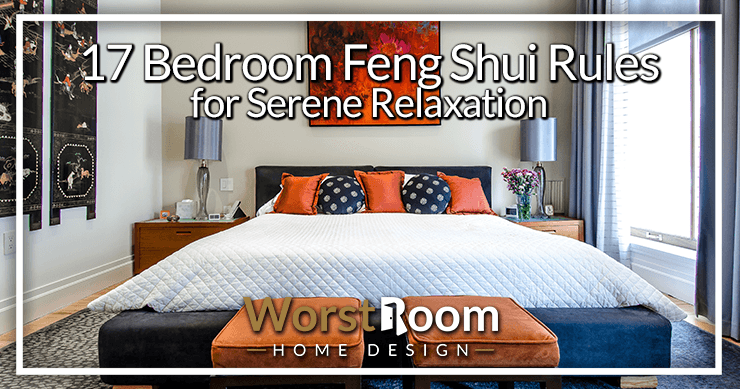
Over 4,000 years ago the ancient Chinese began developing ways to layout their buildings and rooms in a way that matched their cosmology. This quickly turned into promises of health, good fortune, and happiness. People bought into it because they did feel better in these rooms.
But it wasn't necessarily because of anything cosmic or magical. It was because they created a common sense decorating scheme, one that has rules that can be applied to your bedroom as well.
Let's talk about how to feng shui your bedroom simply and get 90% of the benefits with about 10% of the effort.
What is Feng Shui?
Feng shui is the ancient art of Chinese geomancy, in which the layout of the rooms in your home are designed in such a way to create a sense of harmony and balance.
It all started out as a spiritual practice regarding the "architecture of invisible forces," but the auspicious aspect isn't emphasized in the contemporary West.
We allow the rules to inform us, but we focus on the decorating and layout portions mainly.
The invisible forces mentioned above relate to chi (or qi) that flow and bind together our homes, rooms, the planet, and the universe at large. Chi energy flow is the life force of everything.
There are many old disciplines, like the Form School, Compass School, and others that bring in the five elements or the eight cardinal directions, respectively. Modern Western feng shui focuses on the Bagua or Pa Kua symbols of Taoist cosmology.
Anyways, you don't have to dig into all of that to reap the benefits of a more relaxing, harmonious bedroom. You just need to know the basic rules and you can improve the feel of your bedroom quickly.
How to Feng Shui Your Bedroom
Feng shui translates in English to literally "wind and water." The idea is that these forces need to flow freely and can combine to provide positive benefits, but if they're blocked by a poor bedroom layout, everything can be corrupted with negative energy that cause illness and bad luck.
What we want to think about not only the placement of your bedroom furniture in your most important room, but also the directions they face and will have your body facing.
You don't have to think of it in terms of energy, but of how it affects you psychologically. It'll make more sense to you as we justify each rule in this way. It's all about balancing the five elements: wood, fire, earth, metal and water.
Feng Shui Bedroom Rules
Let's get right into the 17 bedroom feng shui tips, explain the rationale behind each, and show through images how they work. We'll try to organize these bedroom ideas in order of importance.
1. Make Your Bedroom Door Visible From the Bed
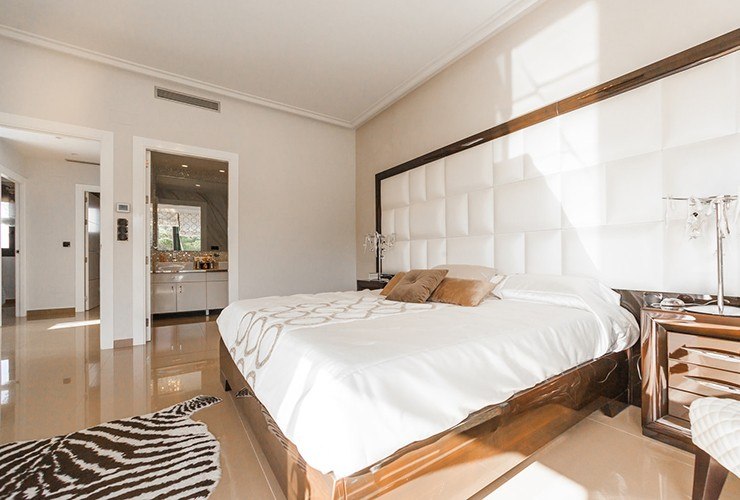
There's a choice for you to make here, based on two schools of thought regarding bed placement. I'm of the opinion that the foot of your bed should always face the opening of your bedroom door.
This creates ease mentally because it adds distance between you and any possible intruder. It gives you more reaction time and higher situational awareness.
The other way people do it is to place the bed in "commanding position," which means having the bed be positioned perpendicular to the door so that the side of the bed faces the room's opening.
Position your bed in this way only if it doesn't bother you mentally. Otherwise, placing your bed where the door is at your feet is best, and better if it's in line with the door. This makes you feel peaceful by reducing the sense of threat.
I feel this works only in much larger bedrooms, mostly in rectangular shaped rooms where the door is at one end of the long orientation and your bed is nearly at the other. Also, stay away from bedroom door alternatives, which will destroy the atmosphere entirely.
2. Have Symmetry of Weight & Space
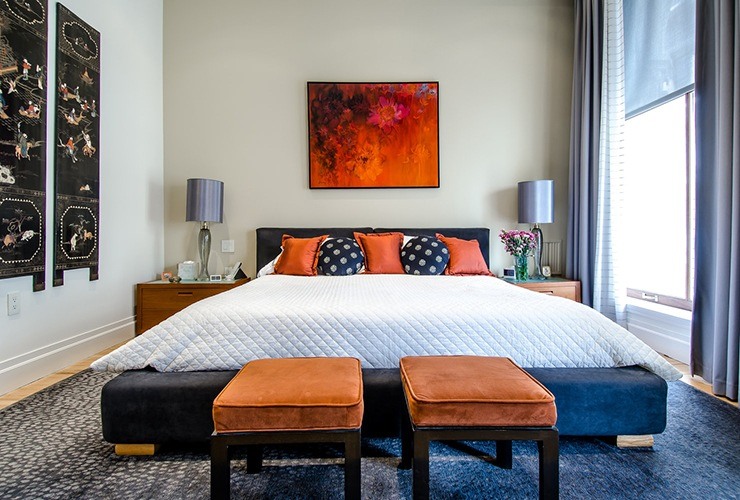
Symmetry means having balance between two sides, like a square or a circle would if you folded them in half or diagonally. But notice I specifically pointed out "weight and space" too. You can't always achieve symmetry of space but you can balance it out with weight and color.
When we say symmetry, the center line we're concerned with balancing around is the middle of your bed. That doesn't mean you must go buy a second side table if you only have one. Just keep equal space on both sides of the bed as a general rule.
You may use your dresser to balance the other side. Since one is undoubtedly bigger, it will need to be further away from the bed to create the harmony we're seeking.
Then again, depending on the color you may move the dresser closer. Now think about various types of floor lamps, a chest of drawers, the closet door, and any chairs that are present.
You want symmetry not only on both sides of the bed, but in 360 degrees around the center of the room too. Artwork will help you achieve this.
3. Artwork Should Be Calming & Appropriately Placed
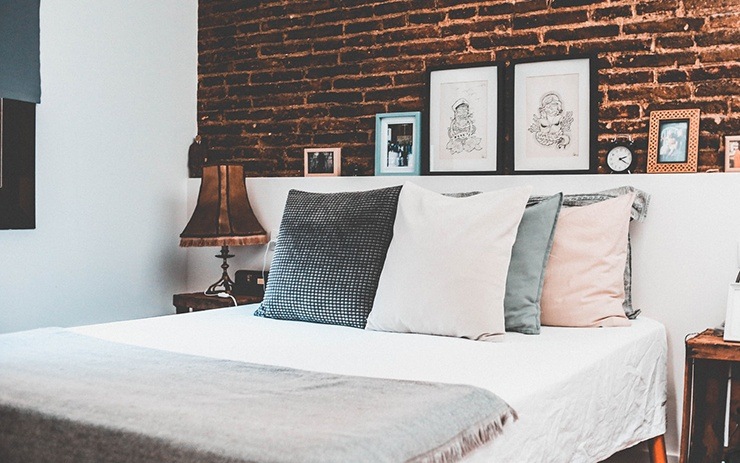
First and foremost, any artwork should be calming. Avoid posters from bands and movies and go for prints of paintings.
Abstract art with soothing colors or paintings of serene locations work best. This generates positive energy by promoting a relaxing aura in the room in which you get your night's rest. Your life force is everything and this gets you in balance.
If you only have one piece of art, don't place it over the headboard of your bed. This is fine if you have multiple pieces of art, but your most sizable wall art should be placed on the solid wall opposite the foot of your bed.
This is so you see it upon waking to start your day in a calm state of mind. A feng shui consultant will say it's the last thing you see before you go to sleep, too, but we all know that's either a book or a cell phone these days (which is a rule breaker).
4. No Electronics Except Lighting
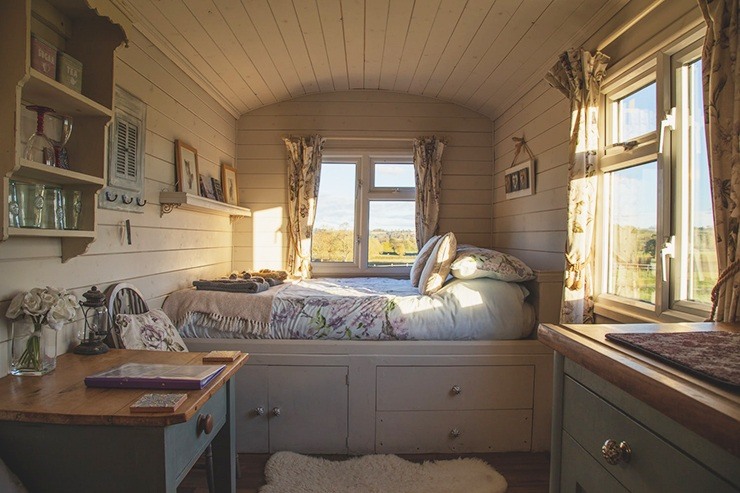
You should have zero electronics in your bedroom except lighting. If you can avoid lamps as well, that's even better. Not all of us have large enough windows pointing in the right directions, though. Why such a strict policy?
Electronics create unnatural light. Digital alarm clocks have blinking lights, among other types of clocks. They all emit electromagnetic fields that can disrupt the flow of chi. They also stop your bedroom from hitting its natural maximum level of darkness, which can disrupt your rest as well.
5. Choose the Right Window Curtains

Curtains are good for the same reasons mentioned above in aiding your room to reach maximum darkness, though you don't want a pure blackout. The slight light of the moon is a positive, though blocking out a streetlight is more important.
Try to choose the right thickness of material to block out most light at night while letting the sunlight in to begin waking naturally as the sun rises.
When it comes to colors, avoid excitable colors like red and depressive colors like black. Those that believe in the magical aspects of feng shui will say to avoid pink because it could create an atmosphere that leads to an affair!
Avoid colors that make you feel anxious or short-tempered. Color psychology is a real thing. Choose a solid, muted, tranquil color. Don't select a color that matches your bedroom walls or furniture too closely. A darker or lighter shade of the same color works well.
Finally, for anything but small windows, choose floor to ceiling curtains or those types of blinds, though curtains are visually better. Do not complicate your room by having patterns or too much ruffles and waves in the fabric. Keep it simple. Your curtains should meld into the rest of the room, not be a standout feature.
6. Reduce Clutter to a Minimum
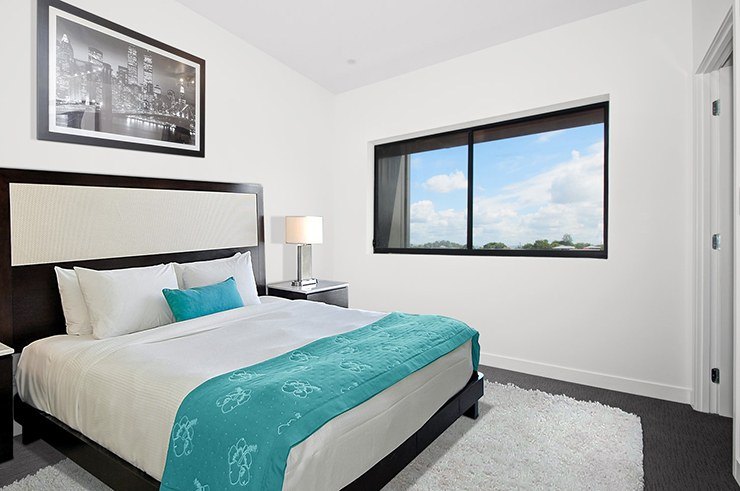
It feels good to cram a room full of things you love and are familiar with. That tends to help make a space feel like it's yours exclusively. That's how "space" becomes "place." But in a bedroom you want spaciousness with minimal distractions to become engaged with.
Your goal is to reduce excitability and promote relaxation. With this and other optimal feng shui principles, less is more with that "less" being in the right places and facing the right directions. Clutter free is the way to be. This includes extraneous books, pillows, nightstands, etc.
Clutter blocks the free flow of chi and is psychologically disruptive. When you decorate and design your bedroom, think about the philosophy of minimalism and you'll be heading in the right direction. The opposite of minimalism (maximalism) is not what you want to follow for this philosophy.
7. Have a Solid Headboard on Your Bed
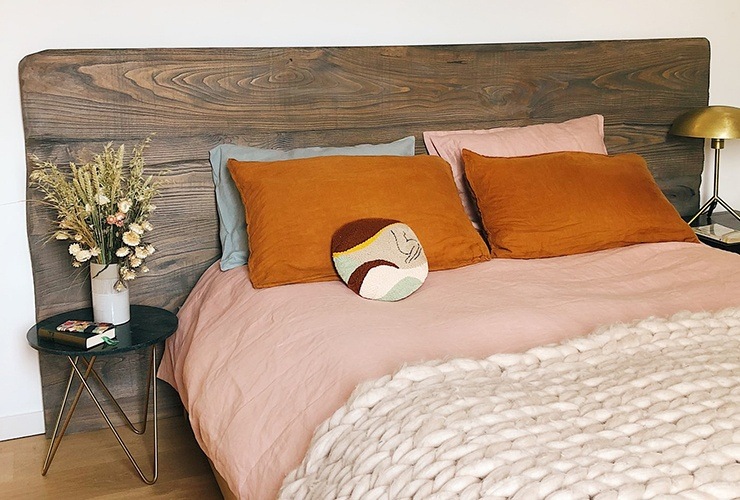
Your bed's headboard plays a big psychological role in your sense of well-being and safety. You want a solid headboard, versus one that is made of vertical bars or horizontally slatted wood. Basically you don't want open space.
You want a solid chunk of wood behind you. It's said that parawood is the best, but I wouldn't get that far into it. The headboard can be upholstered as well.
I personally suggest avoiding the kind with shelving and cubby holes. You want a solid surface nothing can penetrate or hide in to give your mind the psychological assurance that all is well while you're asleep.
Make sure the headboard matches your comforter and whichever of the types of bed sheets you choose, especially when it comes to colors and patterns.
8. Prefer Rounded Furniture over Sharp Corners
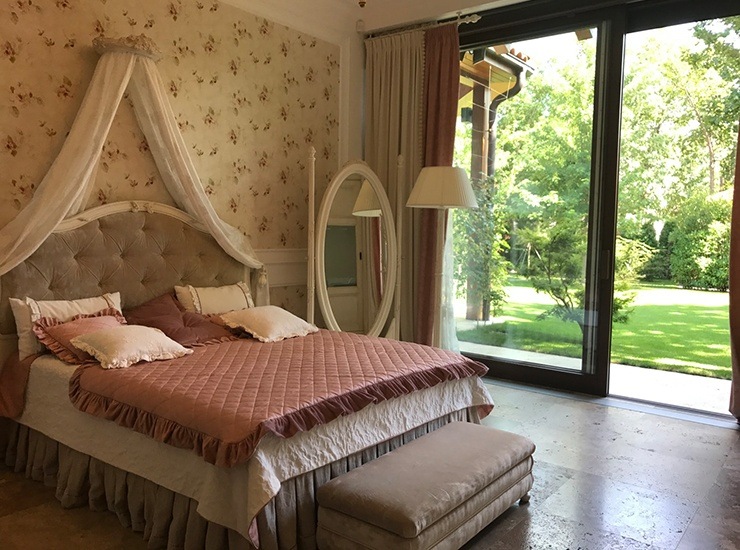
You'll have to decide if this affects you. It doesn't bother me and I prefer sharp corners, but the idea is that the chi has a more difficult time flowing around corners than it does rounded surfaces.
If you must have these harder corners, don't point these corners at your bed. They carve out "poison arrows" that splice the chi in those areas.
In this case, a circular side table is better than a square one, though a square side table with round routed and smooth edges is better than one with no decorative edges at all.
This is all about what your mind finds more settling and relaxing. As a man, I prefer the masculine energy of dark stained wood with defined edges.
9. Choose a Natural, Dispassionate Color Palette
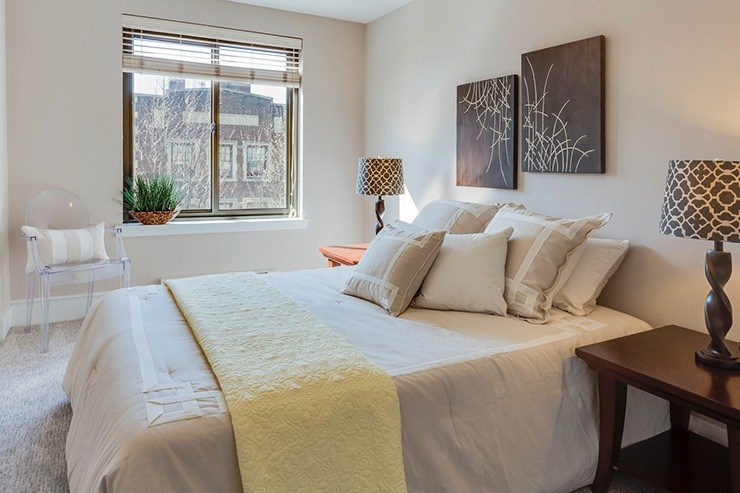
When choosing a color for your walls, decorations, and furniture, try sticking to color shades you can find in nature. And most definitely avoid colors like bright reds, oranges, and yellows.
You want less saturated shades of any color you choose because you're trying to avoid excitability.
Watch out for color combinations. It's fine to choose a secondary color to provide complexity and make certain items "pop," but make sure the combination of two calming colors doesn't become an exciting combination.
Promoting romance and other fire energy emotions is fine, but creating passion in the sense of excitement is working against your interests.
10. When Possible, Accentuate Natural Light
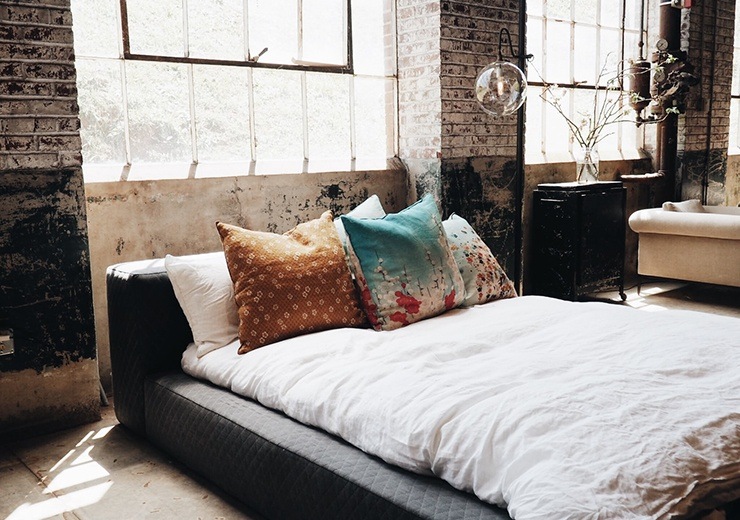
We touched on this before but it deserves it's own rule. The light of the moon and the sun are great enhancers of chi flow. They help you regulate your circadian rhythm, melatonin levels, and energy levels throughout the day.
You want any window curtains to be easily opened and closed and you want your window to be to the side of your bed. If the window is behind the bed you won't benefit from the light, and if it's at the foot of your bed you'll get too much light in your eyes while sleeping.
Don't cover your window with a dresser or your headboard. You want it fully exposed and usable. Opening your window in the evening can let fresh air and chi flow through. Fresh, cool air and natural scents during the evening will knock you out cold, providing a restful night's sleep.
11. Use Scented Candles, Air Freshener, & Incense
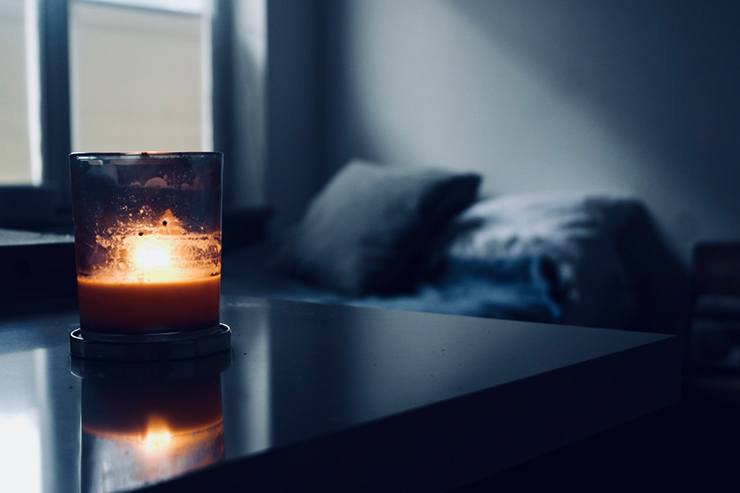
Auspicious scents not only ward off negative energies (make you feel relaxed and comfortable), but they hide nasty scents like a clothes hamper or cat litter box. You can use these scented candle alternatives to compliment the atmosphere you've created with your color scheme.
You can roll through the aisle at Walmart or Target and find a matching scent easily. The air freshener companies have already color-coded their cans.
Various types of candles can also bring in romance, calmness for meditation, provide some fire energy in the room to balance the chi, and provide dimmed lighting as needed. Incense is a great choice if you're into those flavors.
12. Don't Situate Your Bed Beneath a Ceiling Fan or Beam
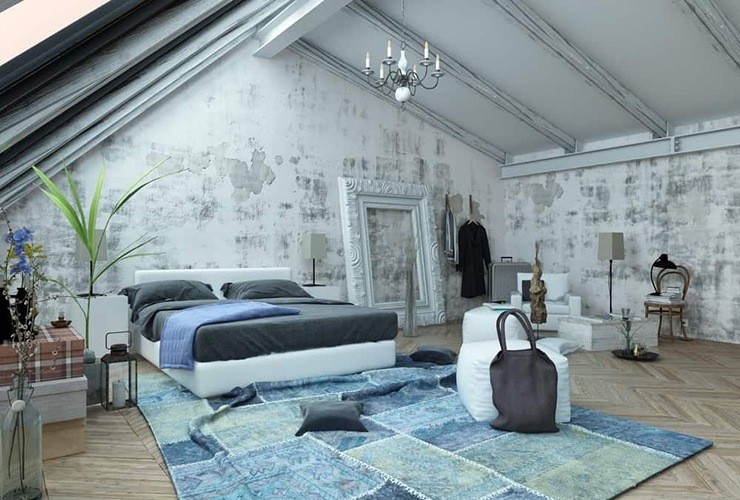
This helps create some complexity is your symmetry balance, forcing you to not physically center everything around your bed in the room.
You'll find it feels better to have this off-set balance, but it is said under feng shui that having your bed be under the center beam of your slanted roof ceiling creates pressure on the body and in the room.
This means you'll be in a zone where the chi can't flow freely. The same goes for a ceiling fan, which disrupts the current of chi. This can also cause you to sit in dry pockets of air where the humidity in your nasal passage becomes too dry.
It's almost better to remove the fan from the ceiling and opt for one of the ceiling fan alternatives.
13. Don't Have a Multi-Purpose Bedroom
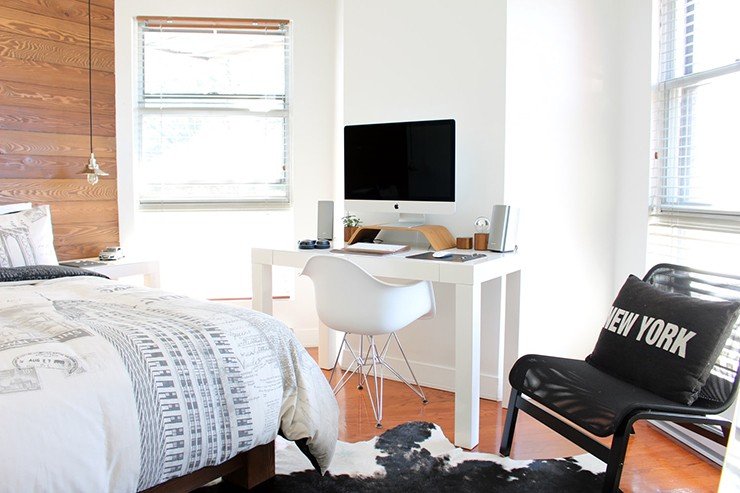
This means that your bedroom should be a bedroom and nothing else. You don't want to cram personal office space in there, a craft table, or anything else that doesn't aid in sleeping or storing your clothing. Keep it sleep related.
The reason is, psychologically, you train your mind to be more active in that room than to purely sleep and relax. In terms of feng shui you start fostering and manifesting the wrong energies, creating an imbalance of chi.
While this is hard to achieve as a young person who isn't renting an entire apartment or doesn't own a house, the benefits can't be emphasized enough. When you consider the dimensions of an average bedroom, there's rarely any room for any other functionality anyways, which worsens the problem.
14. Don't Store Belongings Under Your Bed

It's tempting to slide big plastic boxes of Christmas decorations under your bed so you don't have to climb up in the attic or garage. But don't store anything under your bed, and especially items not related to sleeping and clothing, even if you have skirts or bed skirt alternatives hiding them from view.
This is because you want air flow under your bed to aid in cooling and to help your spring and foam mattresses from forming mold as your body releases oils and humidity into them (box spring alternatives can help with this, too). And also something to do with wind and water energies!
15. Plants in the Bedroom are Bad Feng Shui
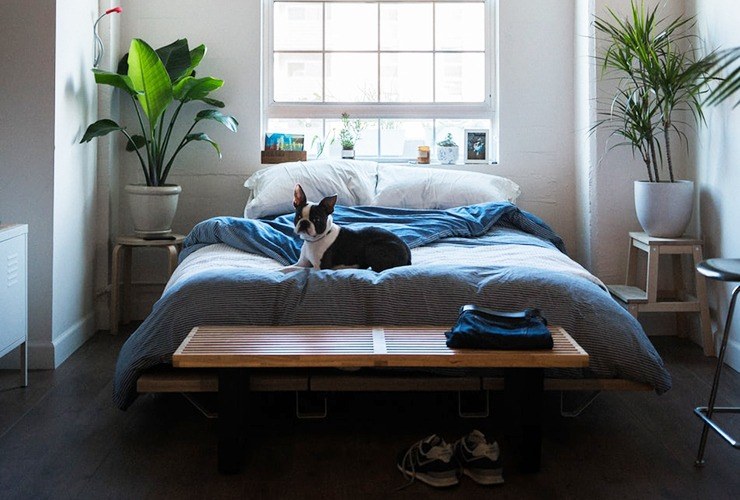
Because we read about using plants to balance energy in other rooms, many of us assume plants in the bedroom would be fine, but it's the opposite. You want the chi slightly flowing but staying passively in the bottom half of the room where your body rests.
Plants create an active flow of energy, cycling it upwards towards the ceiling. You'll also find it's hard to create symmetry and to keep your complimentary color scheme going with plants in the room.
16. Stay Away From Large Mirrors
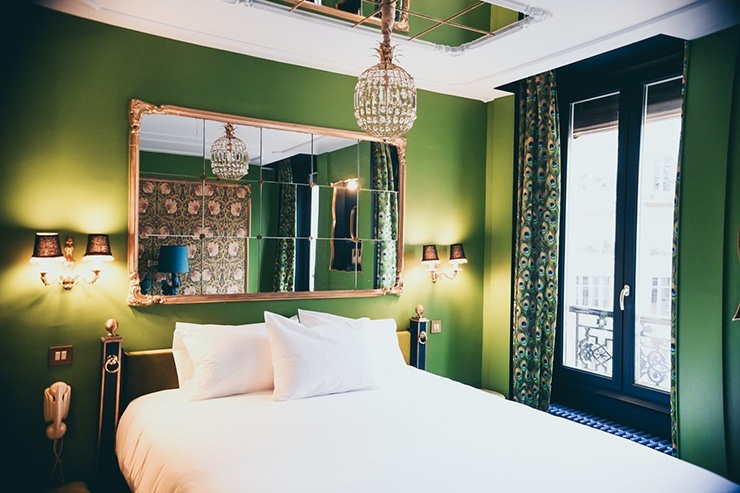
The problem with big types of mirrors in the bedroom, especially ceiling-to-floor mirrors, are two fold. They make the room seem twice as wide, which throws off all visual balance by duplicating the room.
It's said in feng shui philosophies that not only do mirrors attract chi but they then push it off into the opposite direction. It creates too much movement, which implies activity, which is the opposite of rest. There's hardly ever a good spot for a mirror in a bedroom either.
17. Don't Use Water as a Decorative Aspect

Water doesn't rest. It is an active force that moves powerfully, disrupting calm energy as it carves a path through the room. That means having the ocean or a river out of your window's view, having a fish tank, or even paintings of water should not be placed in the room.
While water is said to create wealth and abundance, it counteracts fire in the feng shui in your bedroom, which recharges your libido and life energies as you sleep, which you know is important for mental health. A beach house theme is fine in your house but keep it out of the bedroom.
Feng Shui Bedroom Layout Examples
Below we've created a few simple bird's eye view feng shui bedroom layout images that illustrate some how the same bedroom can do things right and wrong.
While you do so, quiz yourself on which rules they're breaking and see if you can figure it out. We'll explain why each is good and bad too, so don't stress about it. Soon, you'll be the best feng shui expert you know.
Bedroom Feng Shui Layout #1

First and foremost, this layout nails the symmetry. Both sides of the room are balanced from left to right.
From top to bottom it's close and will have more weight with a piece of artwork over the dresser. You could toss a small piece of furniture like a chair in the bottom right to balance the weight of the door on the other side.
It also places the door off-center from the bed, which is good. You don't want your door and bed in a straight line of each other. The fact that the foot of the bed points towards the door means they achieved one of the fundamental rules.
The only rule that this layout is breaking is that the headboard of the bed is blocking a window. There's not many better options since you can't easily move the windows. Using a curtain to cover that window completely would be a good move.
Good Feng Shui Layout #2
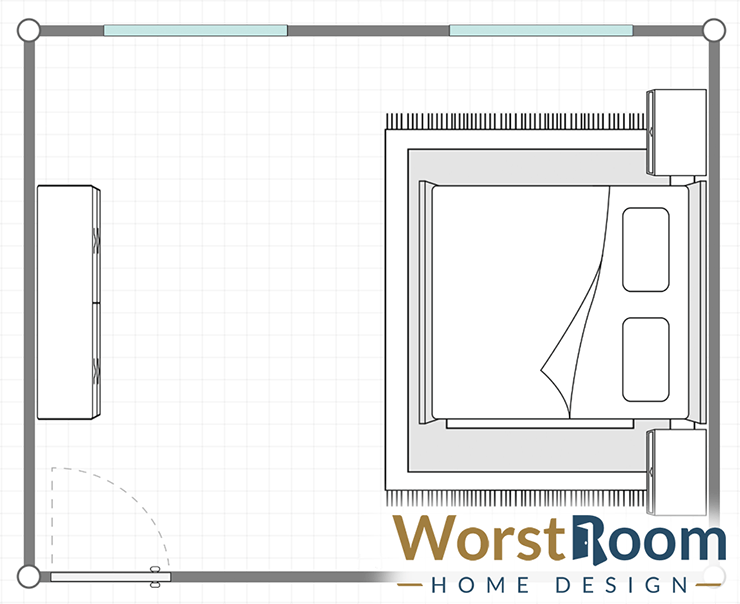
This layout is perfect. The foot of the bed is aimed in the direction of the door and it is furthest from the bed as possible. The symmetry is achieved with the rug and the two nightstands or nightstand alternatives.
And the right types of dressers and artwork are critical, and they are on the opposite side of the room as the bed so the artwork is visible when you pass out and wake up.
Notice as well that neither window is obstructed by the bed and won't shine directly into the sleeper's eyes. Some artwork on the wall opposite of the windows would be good in this scenario.
Feng Shui Bedroom Layout #3

This room feels great in terms of balance and symmetry. One problem, though, is the bed avoids covering up any windows, but there's one problem. The door opening to the room is behind your head, which will produce subconscious fears and paranoia while you try to relax.
Another issue is this room has become a multi-purpose room. It might make sense for a teenager or college-aged person needing to study, but the mind will be trained to have steady attention and to exert effort in this room instead of relaxing.
Get Your Bedroom Feng Shui Down!
Using the rules and examples above, you can rearrange your room in probably less than an hour and have it feeling better than it ever has. With a bit more effort you can apply some more of the guidance really nail it down.
It makes a huge difference especially in the quality of your sleep because your body is allowed to relax more because your mind isn't on guard throughout the night.
It trusts your layout choices psychologically and knows it can better respond to anything that might happen and feels more harmonious in general. Don't hesitate to reach out to a certified feng shui master if you want to take it further.



